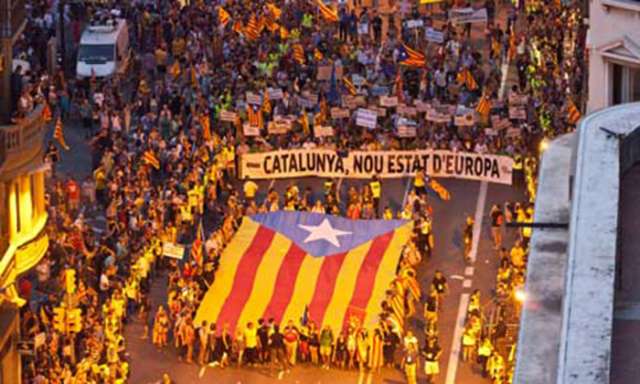As the campaign ends, an aggregate of opinion polls shows the pro-independence Republican Left of Catalonia (ERC) will come top with 33 seats, one or two more than the unionist Ciudadanos (Cs) and JxCat party third with 27 votes. This means no majority for secession and while JxCat leader Carles Puigdemont is in exile in Brussels, ERC head Oriol Junqueras languishes in a Spanish jail.
The tense and febrile situation in Catalonia is being exploited, it is claimed, by vested interests abroad using propaganda and orchestrated disinformation to entrench divisions and may attempt to swing the tight race.
No election in the West at the moment is complete without allegations of Kremlin interference and the Madrid government has declared that it has evidence of this taking place. Spain's Foreign Affairs Minister Alfonso Dastis, said: “We have confirmed it. The aim is to debilitate the European Union. We wish to strengthen and develop our strategic cooperation with other member states and the European Union.”
The European Union’s propaganda monitors report a sizeable increase in flow of fake and alarmist information in Spanish and Russian as the crisis unfolded. The supposed Catalan connection in Moscow’s supposed propaganda web was addressed in London on Tuesday by the Commons Digital, Culture, Media and Sports Committee. Damian Collins, the chairman, said, “One of the topics is the Catalan referendum. On the issue of Catalonia what we aim to do is expose the way fake news is used as a weapon by foreign agencies in elections processes.”
The US Presidential campaign which brought Mr Trump to the White House and the Brexit referendum would also be examined, said the MP.
The Spanish government has also complained about the tweeting of Julian Assange. Foreign Minister Dastis accused him of “trying to interfere and manipulate” the Catalan crisis after the WikiLeaks founder took a sudden interest in the region and claimed that the separatists were being “ repressed”.
The matter was deemed important enough by Madrid to raise with the government of Ecuador whose embassy in London has been hosting Mr Assange for the last five years. This led to Lenin Moreno, Ecuador’s President, declaring: "We do not want to interfere under any circumstances with respect to Catalonia.
"We have reminded Mr Assange that he has no reason to interfere in the politics of nations that are friends," he added. "He does not have the right to do so and he has committed himself to this."
There has also been an unexpected intervention from Manuel Valls, the former French prime minister, who claimed that Islamist terrorists were being helped by the turbulence caused by the independence movement.
The attacks on Ramblas in Barcelona and the seaside resort of Cambrils last August, he said, have been “forgotten about, as if it were just a bad moment, something isolated.”
Mr Valls, whose father is Catalan, has been a vocal opponent of the independence movement, insisting that no French government would ever recognise an independent Catalonia. On terrorism, he commented: "The authors of the attacks were integrated people, they were Moroccan Catalans.
"Catalan politicians should reflect and understand that there are terrorist groups who have decided to bet on Catalonia [breaking away]. Salafism seeks societies that it can divide.
"It’s not just a problem for Spain, it’s a problem for Europe. We are a federation of nation states and if Spain destroys itself it’s a terrible signal for the rest of Europe in a moment of tensions with Brexit, with populism, with Russia," he said. Catalan secession, he cautioned, could boost nationalism in the Basque region, and northern Italy.
Madrid and Barcelona had repeatedly accused each other for security failings over the August atrocities. It has emerged that Spanish intelligence was in contact with an imam who masterminded the attacks while he was in prison. Mr Puigdemont has railed at this “disloyalty” for costing 15 lives.
The Muslim population of approximately 515,000 make up around 15 per cent of the population of Catalonia. There is apprehension among some that the crisis, which has led to a rise in Spanish nationalism, will also boost the far-right. The Generation of Identity movement recently said the separatist crisis has helped in “respecting the Christian history of Europe” and “makes us more organised to prevent Catalan independence and division of Spain.”
Yasin Azoulay, a 29 year old electrical engineer, wearing Catalan ribbons on his jacket at a cafe in The Ramblas, said: “My father came here from Morocco. I consider myself a citizen of Catalonia and I would like to see greater autonomy for Catalonia, although full independence is impractical.
"I have not been influenced by Russians or anyone else. I don’t agree at all with Mr Valls at all: he should remember there have been many more terrorist attacks in his country, France, than here.”
Najat Driouech, who has lived in Barcelona since she was nine years old, stresses that she wants to be the first of many female Muslim MPs in Catalonia. She has joined the list for ERC.
Ms Driouech, 36, was persuaded to stand in the election, she said, by her eight year old son. “We were watching a television debate and I told him these were our political representatives. He asked ‘if they are our representatives, why isn’t there anyone who looks like us?’ That made me decide that as Catalans, we made ourselves feel and heard. “If your name is Abdel, they do not even look at your CV. I don’t want my children to suffer half of what their grandparents suffered, or a quarter of what I had. I want to find a society that is inclusive, equal and recognises diversity.”
Spanish unionists charge that the separatists have already caused huge damage to the Catalan economy and secession will be disastrous for it.
Around 3,000 firms have moved their legal headquarters to elsewhere in Spain. Before the crisis the affluent region hosted seven of the 35 companies on Madrid’s IBEX stock exchange, now it’s down to one.
“Of course young people, Muslims, Christians, whatever, should have jobs. But the separatists are making sure that jobs are disappearing for everyone," said an exasperated Xavi Ruiz Martinez, a businessman and supporter of the unionist Ciudadanos Party. "They talk of outside influence in this election, I am surprised our commercial competitors are not carrying this out as well, they are the big winners in this tragedy.”
More about: #Catalonia
















































